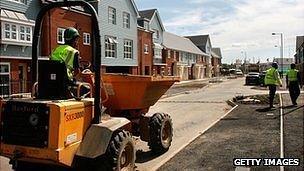Budget 2013: Chancellor extends home-buying schemes
- Published
George Osborne outlines his 'Help to Buy' plans
Chancellor George Osborne has announced new plans to help people to buy their own homes.
The Help to Buy scheme , externalexpands a previous scheme, FirstBuy, which was aimed solely at first-time buyers.
It enables all purchasers to put down a 5% deposit on a newly built home, much less than some banks now demand.
Up to 20% of the cost of the home will be funded by a shared equity loan, which will be interest-free for the first five years.
This will in effect see the government taking a stake in the value of borrowers' homes. It plans to invest £3.5bn in these loans.
The value of the shared equity loan is linked to the property's value. So, for example, if the value the property has doubled by the time the shared equity loan is repaid, the amount the borrower has to repay will have doubled, too.
In year six, borrowers will have to pay a 1.75% annual fee, which will rise by 1% above the Retail Prices Index (RPI) measure of inflation every year after that.
The remainder of the value of the property is paid for with a standard mortgage, to cover up to 75% of the loan.
Whereas the previous scheme FirstBuy was only open to first-time buyers, this one will be available to all buyers of newly built homes. Previously there was also an income limit of £60,000 a year, but this will no longer apply.
It will cover newly built homes up to the value of £600,000.
Borrowers will be able to apply from 1 April 2013.
Mortgage help
The chancellor also announced a new mortgage guarantee, which he claimed would dramatically increase the availability of loans. It extends the previous NewBuy Guarantee scheme to include older houses as well as new-builds.
"We're going to help families who want a mortgage for any home they're buying, old or new, but who cannot begin to afford the kind of deposits being demanded today," he said.
It will run for three years from the start of 2014 and will be used to support £130bn of mortgages.
That is a relatively small proportion of the total mortgage market, which is worth £1.2 trillion, according to the Council of Mortgage Lenders (CML).
The idea is that loans from High Street lenders would be underwritten by the government.
If a borrower defaults on a mortgage, he or she would stand to lose their 5% deposit. Thereafter the government would have to pay just under 15% of the outstanding amount, while the lender would be liable for just over 80%.
But in theory, lenders taking part will be happier to accept smaller deposits as security for loans.
Up to now, the best mortgage rates have only been available to those able to put down a deposit of up to 20%.
"It's a great deal for homebuyers," said the chancellor.
The news was also welcomed by lenders.
"We believe that the mortgage guarantee scheme will give a much-needed boost to the housing market and, most importantly, address the issue of accessibility," said Stephen Noakes of Lloyds Banking Group.
"Crucially, this scheme will not only help first-time buyers, but also second-steppers," he added.
But buy-to-let landlords will not be allowed to take advantage of the scheme.

Housebuilders believe sales will rise as a result of the scheme
Reservations
The Royal Institution of Chartered Surveyors (RICS) warned that the new scheme could represent a risk for the government.
"The government needs to be careful this doesn't create another housing bubble - pushing prices up at the expense of buyers," said Simon Rubinsohn, chief economist at RICS.
However, he welcomed Help to Buy overall, saying it was much needed, and that it would prevent prolonged market stagnation.
The Home Builders Federation (HBF) said lenders would need to come on board, but suggested sales should rise as a result.
"Extending NewBuy to the second hand market should create churn in the market place and drive up sales across the Board - including for new homes.
"We do, though, need to ensure a level playing field across the whole market," said Stewart Baseley, of the HBF.
The previous NewBuy scheme was launched a year ago, but has resulted in only 1,500 new homes being sold in its first nine months, compared with a government target of 100,000.
"The maths suggest that the chancellor has 110,000 shared equity homes in his sights under the Help to Buy scheme" said Frank Nash, from Chartered Accountants Blick Rothenberg.